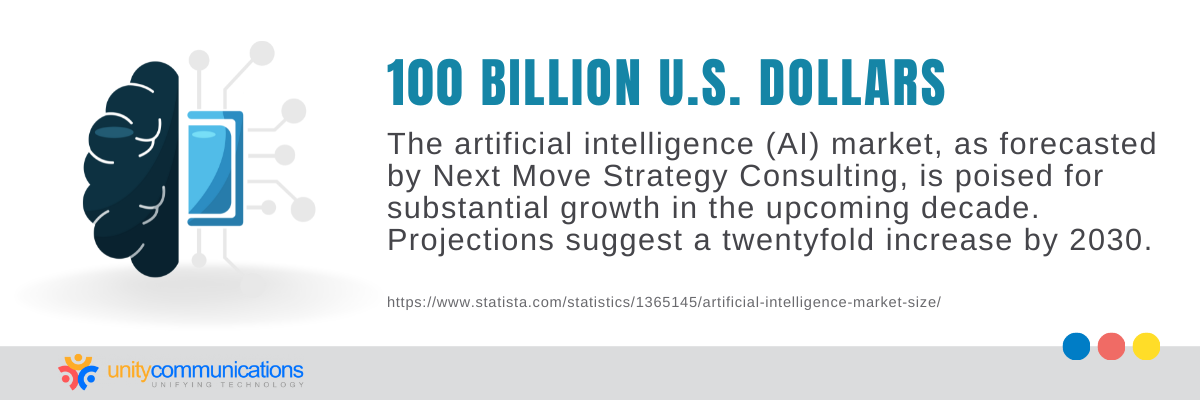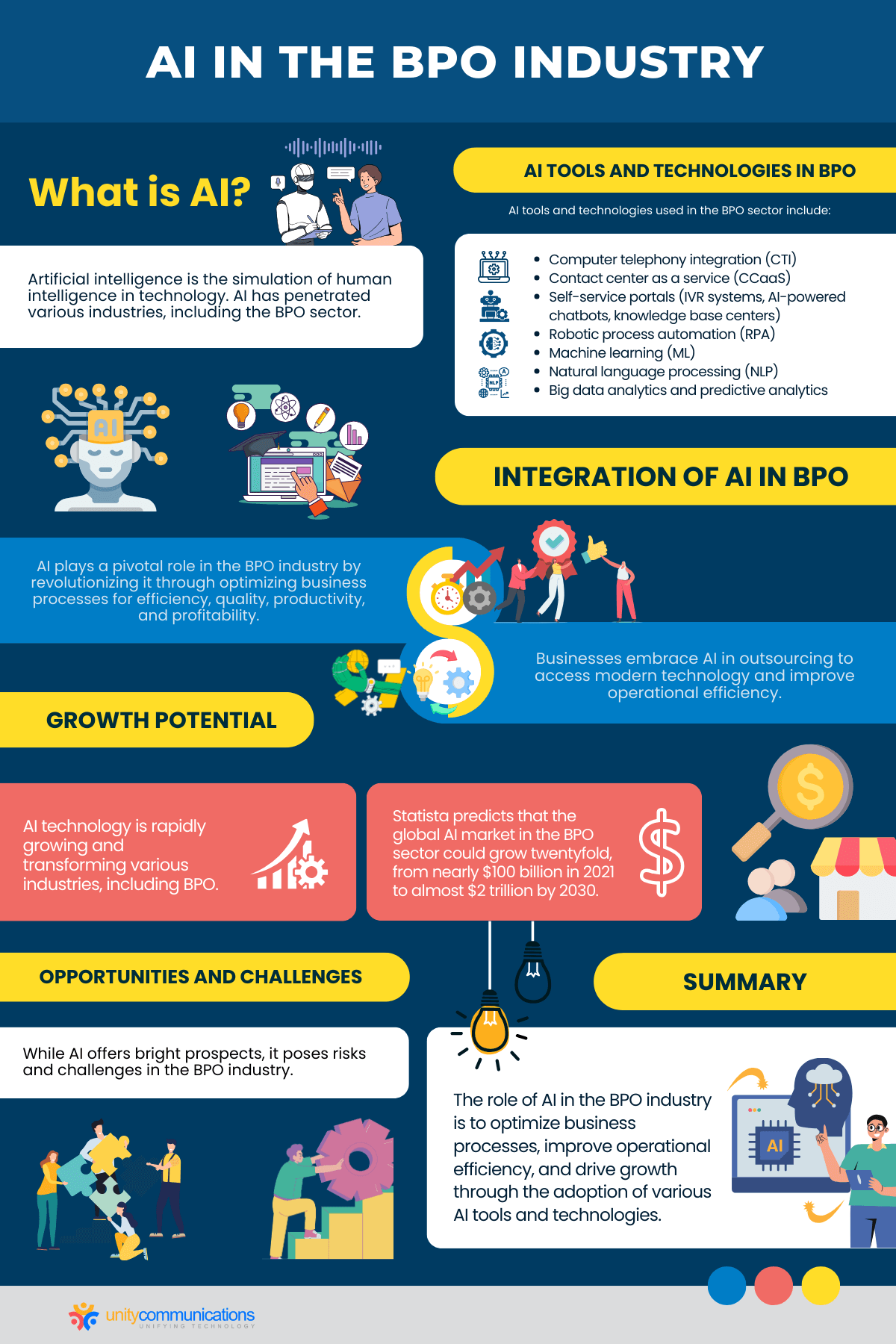IN THIS ARTICLE
Table of Contents
Since its inception, artificial intelligence (AI) has become a game-changer in the business landscape. Think of automation for process acceleration, machine learning (ML) for data analysis, and conversational AI for customer service.
The business process outsourcing (BPO) sector is at the forefront of leveraging AI for competitive advantage since it caters to various industries globally. While AI technology offers many potential benefits for BPO providers and clients, it also comes with possible risks.
This page delves into the role of AI in BPO. Read on to explore the opportunities and challenges of integrating AI into outsourcing.
The Role of AI in the BPO Industry

Simply put, AI is the simulation of human intelligence in technology. AI has penetrated various industries, including the BPO sector. Businesses have started embracing the opportunities and challenges of integrating AI into outsourcing.
But what is BPO? BPO entails contracting a third-party service provider to perform particular functions or tasks instead of handling them in-house. One of the reasons companies outsource is to access modern technology, such as AI solutions.
Technological adoption for digital transformation is one of the BPO trends in the coming years. AI plays a pivotal role in the outsourcing industry. This technology revolutionizes the industry by optimizing business processes for efficiency, quality, productivity, and profitability.
Below are some AI tools and technologies used in the BPO sector:
Computer telephony integration (CTI): used in call centers with advanced features such as automatic dialing, intelligent call routing, and automated screen pops
Contact center as a service (CCaaS): best for contact centers with multiple communication channels (phone calls, emails, and chat support)
Self-service portals: include integrated voice response (IVR) systems, AI-powered chatbots, and knowledge base centers
Robotic process automation (RPA): used for automating routine, repetitive tasks and accelerating processes
Machine learning (ML): ideal for fraud detection in financial services, customer segmentation in marketing, and predictive analysis for call center forecasting
Natural language processing (NLP): used for customer service as it can interpret conversations in customer interactions
Big data analytics and predictive analytics: best for targeting potential customers in sales and marketing as well as analyzing customer data required for forecasting contact volume
AI technology is rapidly growing and transforming various industries, including the BPO sector. According to Statista, its global market could grow twentyfold, from nearly $100 billion in 2021 to almost $2 trillion by 2030. But while AI’s prospects look bright and promising, this nascent technology poses risks and challenges.
The next section explores the opportunities and challenges of integrating AI into outsourcing.
AI Integration in BPO: Exploring Business Opportunities
Implementing AI solutions in the BPO industry has opened up exciting business opportunities. This technology proves incredibly beneficial for companies looking to outsource. Let us explore its potential benefits in the outsourcing industry below:
Improved operational efficiency. AI systems and tools can speed up back-end tasks that delay customer-facing and administrative functions that support business operations. Think of RPA as an automation tool that automates BPO tasks, reduces manual work, and accelerates business processes. This capability can lead to an increase in your overall efficiency.
Increased business productivity. AI-integrated platforms automate business processes. Rather than AI replacing call center agents, AI helps speed up non-core tasks, allowing employees to prioritize core functions. For example, BPO agents can focus on providing e-commerce customer support instead of spending time on manual data entry and inventory management.
Targeted leads and increased sales. Data and predictive analytics can help develop a buyer persona, target prospects, and generate leads. These AI tools can assist telemarketers in their jobs and help boost their sales. Their wide use is one reason businesses welcome both the opportunities and challenges of integrating AI into outsourcing.
Enhanced digital marketing. AI tools and systems can optimize online marketing strategies such as search engine optimization (SEO), pay-per-click (PPC) advertising, and content marketing. For instance, you can leverage ChatGPT and other generative AI platforms for content creation and produce blogs, guest posts, or marketing copy.
Effective customer service. BPO call centers leverage CTI and CCaaS technology with automation and AI adoption. They can empower BPO agents to assist customers faster and better. Enhanced output improves the customer’s journey, experience, and satisfaction.
Empowering self-service portals. They empower BPO agents, and AI-integrated platforms also help customers. Consider self-service portals such as IVR systems, chatbots, and knowledge base centers. These are a few reasons BPO service providers embrace the opportunities and challenges of integrating AI into outsourcing.
Seamless contact management. CTI and CCaaS technologies have advanced features such as automatic dialing and data analysis. Contact center agents can seamlessly answer incoming calls and place outgoing calls. The same applies to quality assurance (QA) teams auditing contacts and management generating reports.
Solid data recording and analysis. AI in BPO ensures efficient and accurate data recording and analysis. AI-powered tools can extract, organize, and analyze vast amounts of data. Based on patterns and trends, they provide valuable insights for business forecasting, decision-making, and process improvements.
AI Integration in BPO: Addressing Potential Challenges
Businesses should not only see the opportunities but also the challenges of integrating AI into outsourcing. While we welcome the potential benefits of this technology, let us also prepare for possible challenges:
Data dependence. AI relies heavily on datasets to learn, solve problems, and make decisions. Unfortunately, nearly one-third of business executives encountered data-related challenges that hindered their AI initiatives. As a business or service provider, ensure AI is consistently fed accurate and reliable information.
Technology deficiency. Dystechnia, or flawed efficacy in technology use, deployment, and logistics, is common in technological advances. Albeit promising, AI has its fair share of deficiencies, such as AI model errors and inaccurate data. BPO service providers should double-check information and reduce margins of error.
Algorithm bias. Businesses should embrace the opportunities and challenges of integrating AI into outsourcing. They must be wary of algorithmic biases in AI technologies, which can lead to discriminatory outcomes. Businesses should ensure accurate data and fair decisions to avoid ethical and legal repercussions.
Implementation complexities. Integrating AI with BPO might be complicated for some businesses. It requires specialized talent for data integration, system compatibility, and change management. To avoid business disruptions and ensure smooth adoption, ensure proper planning, involve tech experts, and perform careful execution.
Consumer distrust. The public’s perception of AI is not always positive. People are concerned about its impact on privacy and security, leading to consumer distrust. Businesses must be transparent about their AI initiatives, address concerns, and ensure the responsible use of AI to maintain consumer trust.
Data privacy and security. AI processes sensitive data, making it vulnerable to physical and cyberattacks. This technology raises concerns about data privacy and security breaches, even in BPO. Embrace the opportunities and challenges of integrating AI into outsourcing by establishing network security protocols and data privacy policies.
Ethical considerations and legal implications. AI technologies raise ethical considerations such as data accuracy, utilization transparency, and business accountability. If left unattended, companies might face legal and financial consequences. When using AI, ensure compliance with legal and regulatory frameworks.
The Bottom Line

AI has started disrupting the world of business. Aside from the tech industry, the BPO sector is among the pioneers leveraging AI. As such, consider outsourcing to capitalize on this technology.
AI improves efficiency, productivity, customer satisfaction, and business profitability. Maximize the opportunities and mitigate the challenges of integrating AI into outsourcing with proper planning and execution. Consider some of the recommendations above to minimize the technology’s risks.
Looking to take advantage of AI technology for your processes? Work with Unity Communications! We utilize the latest technology to help improve your operations and scale your business. Let’s connect today to get started with outsourcing!





